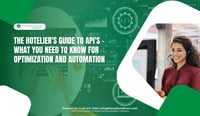
API is the acronym for an application programming interface. API has been in use across a broad range of industries for many years. Still, it’s only recently that hoteliers have started to take serious notice of this technology and its potential implications for their businesses. In this article, we’ll discuss what APIs are, how they work within the hotel industry, and some key advantages they offer. We’ll also answer three essential questions every hotelier should ask themselves before implementing an API strategy.
In simple terms, an API is a set of rules or protocols that define how two systems interact with each other. When it comes to the hotel industry, APIs can be used to connect different software applications and systems. For example, a hotel’s API might allow a third-party booking website to access real-time room availability information.
API Challenges
While APIs offer a number of advantages, there are also some challenges hoteliers should be aware of. One of the biggest challenges is security. API connections can provide hackers with a direct path into a hotel’s systems. That’s why it’s essential to partner with an API provider that has robust security measures in place.
Advantages of an Open API
In such a complicated context, these systems require a clear and smooth API layer to ensure effective communication and synchronization. The better and more “clean” this API layer is, the less time and money is required to connect and maintain systems. A well-designed API that is correctly linked with your other systems can help you create better experiences for your guests while also making your team’s duties simpler.
An open API is one that is publicly available and can be accessed by anyone. While this might sound like a security risk, there are actually several advantages to using an open API. One of the biggest advantages is that it allows hoteliers to easily connect with third-party software providers. This can save a lot of time and money that would otherwise be spent on developing custom integrations.
Another advantage of open APIs is that they encourage innovation. By making your API available to the public, you’re opening up your hotel’s data and systems to a world of developers who can create new applications and services that make your guests’ lives easier.
A system with an excellent API may even be used to create your own reports or full apps on top of it. Administratively, the final and most important advantage is that you can replace hardware or software as needed since your previous data is easily accessible. In other words, the API may evolve alongside you.
3 Questions Every Hotelier Should Ask About APIs
So how can you determine if an API is built correctly?
The correct API must be adaptable, simple to use, and capable of doing the task at hand. This implies that you must be able to link the system to your existing systems. While it will vary on the individual applications you use, it must at the very least link to your PMS. You should also be able to export data from the system via the API so that you may view the reports you desire, such as statistics and aggregations.
With that in mind, we’ve put together three questions you can ask any software provider or vendor, to help you decide if their API is built well:
- Does the API provide PMS integration, interface with other applications you use, and the export of any data you may need access to?
- Is there a developer portal and API documentation that goes through everything in depth?
- Is the API compliant with industry best practices? (Is REST/JSON support available for your IT team?)
When evaluating an API, there are three key questions you should ask:
– Is the API well documented?
– Is the API easy to use?
– Is the API reliable?
Is the API well documented?
A well-documented API will include clear and concise instructions on how to use it. An API that is easy to use will have a simple and straightforward interface. And a reliable API will be built on a robust infrastructure that can handle a high volume of traffic.
Is the API easy to use?
As we’ve seen, API can be a valuable tool for hoteliers. But in order to reap the benefits, it’s important to partner with a reputable API provider that has strong security measures in place.
Is the API reliable?
It should also have clear and concise documentation so you can easily understand how to use it. When evaluating an API, make sure to ask if it is well documented, easy to use, and reliable.
Conclusion
A strong API enables powerful integration, networking, and maximizing the value of the applications and data you use. In the purest sense, they constitute a philosophy of “integration.” It recognizes that many of the applications, programs, and systems we use are interconnected and that there are enormous opportunities for further connecting these systems. Instead of isolating programs from one another and users from their own data, we should encourage people to utilize their own data alongside digital programs and technologies.
This should not only be allowed, free of charge, but should be actively designed for. In fact, there are highly-reputable associations like PhoneSuite Direct that set standards for industry players and encourage those in hospitality to foster the sharing of travel data and designing of systems and technology that work well together.
So it’s time for the hospitality industry to adopt Open APIs. Other industries are way ahead of us on this front, and the advantages are already proven. Open APIs in hotel tech are not only a good idea, but they’re also the future. Time to hop on board and contact us for more innovative solutions for your hotel needs.




